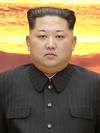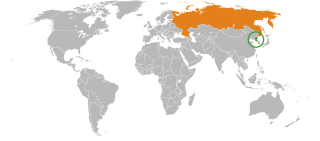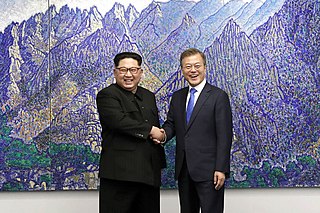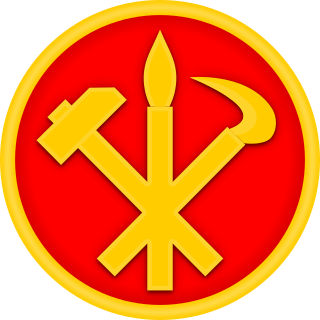| |||||
| Centuries: | |||||
|---|---|---|---|---|---|
| Decades: | |||||
| See also: | Other events of 2022 Years in North Korea Timeline of Korean history 2022 in South Korea | ||||
The following is a list of events from the year 2022 in North Korea .
| |||||
| Centuries: | |||||
|---|---|---|---|---|---|
| Decades: | |||||
| See also: | Other events of 2022 Years in North Korea Timeline of Korean history 2022 in South Korea | ||||
The following is a list of events from the year 2022 in North Korea .
| Photo | Position | Name |
|---|---|---|
 | General Secretary of the Workers' Party of Korea | Kim Jong-un |
 | Chairman of the Standing Committee of the Supreme People's Assembly | Choe Ryong-hae |
 | Premier of North Korea | Kim Tok-hun |
North Korea's Ministry of Foreign Affairs published a commentary on 26 February titled "The United States must not undermine the foundation of international peace and stability", ascribing the armed conflict to US "high-handedness and arbitrariness," and accusing Washington of pursuing "military supremacy" in disregard of Russian security concerns. In a post on the foreign ministry website, Ri Ji-song, a researcher at the Society for International Politics Study, made the remarks—the North's first public mention of the conflict following Russia's invasion of Ukraine earlier that week. "The root cause of the Ukrainian crisis also lies in the high-handedness and arbitrariness of the U.S. which has held on solely to the unilateral sanction and pressure while pursuing only global hegemony and military supremacy in disregard of the legitimate demand of Russia for its security," Ri wrote. The Yonhap News Agency quoted a North Korean studies professor at Ewha University in Seoul as calling the post a "cautious" official response from Pyongyang, since it was released in the name of an individual. [1]

Kim Yong-nam is a North Korean retired politician who served as the President of the Presidium of the Supreme People's Assembly of North Korea, from 1998 until 2019. Previously, he served as Minister of Foreign Affairs from 1983 to 1998. He was elected a member of the Presidium of the Workers' Party of Korea (WPK) in 2010.

Kim Jong Un is a North Korean politician who has been supreme leader of North Korea since 2011 and the leader of the Workers' Party of Korea (WPK) since 2012. He is the third son of Kim Jong Il, who was North Korea's second supreme leader from 1994 until his death in 2011, and Ko Yong Hui. He is a grandson of Kim Il Sung, who was the founder and first supreme leader of North Korea from its establishment in 1948 until his death in 1994.

North Korea–Russia relations are the bilateral relations between Russia and North Korea. The Soviet Union was the first to recognize North Korea on October 12, 1948, shortly after the proclamation, as the sole legitimate authority in all of Korea. The Soviet Union supported North Korea during the Korean War. North Korea was founded as part of the Communist bloc, and received major Soviet military and political support. The comprehensive personality cult around North Korea's ruling family was heavily influenced by Stalinism. China and the Soviet Union competed for influence in North Korea during the Sino-Soviet split in the 1960s, as North Korea tried to maintain good relations with both countries.

The 2009 North Korean nuclear test was the underground detonation of a nuclear device conducted on Monday, 25 May 2009 by the Democratic People's Republic of Korea. This was its second nuclear test, the first test having taken place in October 2006. Following the nuclear test, Pyongyang also conducted several missile tests. A scientific paper later estimated the yield as 2.35 kilotons.

India–North Korea relations, also called Indian-North Korean relations or Indo-North Korean relations, are the bilateral relations between India and North Korea. Both countries have growing trade and diplomatic relations. India maintains an embassy in Pyongyang, and North Korea has an embassy in New Delhi.

The death of Kim Jong Il was reported by North Korean state television news on 19 December 2011. The presenter Ri Chun-hee announced that he had died on 17 December at 8:30 am of a massive heart attack while travelling by train to an area outside Pyongyang. Reportedly, he had received medical treatment for cardiac and cerebrovascular diseases, and during the trip, Kim was said to have had an "advanced acute myocardial infarction, complicated with a serious heart shock". However, it was reported in December 2012 by South Korean media that the heart attack had instead occurred in a fit of rage over construction faults in a crucial power plant project at Huichon in Chagang Province.

Kim Il Sung died of a sudden heart attack on the early morning of 8 July 1994 at age 82. North Korea's government did not report the death for more than 34 hours after it occurred. An official mourning period was declared from 8–17 July, during which the national flag was flown at half mast throughout the country, and all forms of amusement and dancing were prohibited.
Ri Yong-gil is a North Korean military officer who is currently a vice chairman of the Central Military Commission of the Workers' Party of Korea and the Chief of the General Staff.

Ri Su-yong, also known as Ri Chol (이철), is a North Korean diplomat and politician, serving as the Minister of Foreign Affairs of North Korea from April 2014 until May 2016.

Ri Yong-ho is a North Korean politician and diplomat who served as Minister of Foreign Affairs of North Korea from 2016 to 2020. He was reportedly executed in 2022, according to the Japanese newspaper Yomiuri Shimbun, citing unnamed sources. South Korea's National Intelligence Service confirmed he was purged but was not able to verify his reported execution.

The April 2018 inter-Korean summit took place on 27 April 2018 on the South Korean side of the Joint Security Area, between Moon Jae-in, President of South Korea, and Kim Jong Un, Chairman of the Workers' Party of Korea and Supreme Leader of North Korea. The summit was the third inter-Korean summit - the first in eleven years. It was also the first time since the end of the Korean War in 1953 that a North Korean leader entered the South's territory; President Moon also briefly crossed into the North's territory.

The 2018 North Korea–United States Singapore Summit, commonly known as the Singapore Summit, was a summit meeting between North Korean Chairman Kim Jong Un and U.S. President Donald Trump, held at the Capella Hotel, Sentosa, Singapore, on June 12, 2018. It was the first-ever meeting between leaders of North Korea and the United States. They signed a joint statement, agreeing to security guarantees for North Korea, new peaceful relations, the denuclearization of the Korean Peninsula, recovery of soldiers' remains, and follow-up negotiations between high-level officials. Both leaders also met separately with Singaporean Prime Minister Lee Hsien Loong.

The Propaganda and Agitation Department, officially translated as the Publicity and Information Department, is a department of the Central Committee of the Workers' Party of Korea (WPK) tasked with coordinating the creation and dissemination of propaganda in North Korea. It is the highest propaganda organization in the country.

Choe Son-hui is the Minister of Foreign Affairs of North Korea. Previously the First Vice Minister of Foreign Affairs, she was appointed Minister on 11 June 2022, becoming the first woman to hold the position and is one of few North Korean women holding a high-level office.
The September 2018 inter-Korean summit was the third and final inter-Korean summit in the 2018-19 Korean peace process.

The United Front Department of the Workers' Party of Korea is a department of the Central Committee of the Workers' Party of Korea (WPK) tasked with relations with South Korea. It conducts propaganda operations and espionage and manages front organizations, including the Chongryon.
Jong Kyong-thaek is a North Korean politician. He served as the Minister of State Security from 2018 to 2022, a member of the Central Military Commission of the Workers' Party of Korea (WPK), an alternate member of the Politburo of the WPK, and a member of the State Affairs Commission of North Korea.

Hwang Sun-hui was a North Korean politician who served in several high-ranking positions in the Workers' Party of Korea (WPK), including in the Supreme People's Assembly and the Central Committee of the WPK. She was affiliated with the Korean Revolution Museum from 1965, and was its director from 1990.

This is a list of military parades held in Pyongyang, the capital of the Democratic People's Republic of Korea (DPRK) since 1948. All military parades consist of troops from the Korean People's Army and the paramilitary Worker-Peasant Red Guards. All military parades of a national nature are held on Pyongyang's Kim Il-sung Square with the General Secretary of the Workers' Party of Korea, President of the State Affairs Commission and Commander-in-Chief of the Armed Forces of North Korea in attendance. These parades are broadcast live on Korean Central Television.

The COVID-19 pandemic in North Korea was part of an ongoing global pandemic of coronavirus disease 2019 (COVID-19), a novel infectious disease caused by severe acute respiratory syndrome coronavirus 2 (SARS-CoV-2). North Korea confirmed its first case on 8 May 2022.